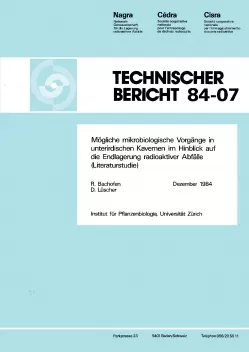
Technischer Bericht NTB 84-07
Mögliche mikrobiologische Vorgänge in unterirdischen Kavernen im Hinblick auf die Endlagerung radioaktiver Abfälle(Literaturstudie)
A nuclear waste repository is not expected to be free from microorganisms. The question arises whether growth and physiological activity of these organisms might present a risk for the safety of the waste disposal. The availablity of water is an absolute prerequisite for the development of microorganisms. It can be present as condensed water inside the waste containers or due to water entering into the cavern. If this basic necessity is fulfilled, the activity of certain bacteria may become important. Microorganisms are capable of degrading organic material and may contribute to the corrosion of metals and concrete by excreting acids. Products of metabolism might transform insoluble substances, as e.g. certain heavy metals, into soluble forms. Finally gases might be formed and this could lead to the development of inflammable mixtures. It is, however, not possible to give a quantitative assessment of the consequences of microbial activities in a nuclear waste disposal because the existing data base is not sufficient.
